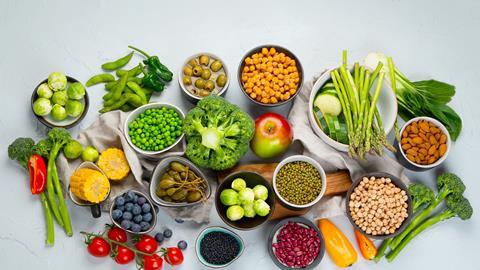Influential publication underlines the importance of plant-rich diets for the good of people and planet
Plant-rich diets full of fruit and vegetables should be at the centre of a mindset shift that could prevent around 15 million premature deaths every year, a major new report has concluded.
The influential EAT-Lancet Commission’s 2025 report on Healthy, Sustainable and Just Food Systems is regarded as leading the debate in terms of a comprehensive global scientific evaluation of food systems.
It builds on the groundbreaking 2019 EAT-Lancet report, and stresses that ‘just’ food systems will be essential to achieving improved health and social development outcomes.
It says that fewer than one per cent of the world’s population is currently in the ‘safe and just space’, where people’s rights and food needs are met within planetary boundaries.
According to the report, currently almost a third (32 per cent) of food system workers earn below a living wage. Meanwhile, the wealthiest 30 per cent of people drive more than 70 per cent of food-related environmental impacts, and despite global calorie sufficiency more than one billion people remain undernourished.
The report’s analysis suggests that reshaping systems could deliver returns of $5 trillion a year through better health, restored ecosystems, and climate resilience – more than 10 times the $200-500 billion investment needed to drive food systems change.
Achieving these goals requires urgent policy action, dietary consumption transformation, and a realignment of global financial incentives to support just, resilient, and sustainable food systems, it says.
Drawing on the most recent evidence and advanced modelling, the report sets the boundaries of how 9.6 billion people globally can eat nutritiously and equitably within critical environmental boundaries by 2050.
It shows that changes to the way we produce and consume food can improve global health, achieve food and nutrition security, build stability and resilience, and contribute to critical strategies to improve equity and working conditions in food systems.
Plant-rich diets and subsidised healthy food
Building on existing data, the 2025 Commission underlined the benefits of the Planetary Health Diet, which sets out recommendations for healthy diets that ensure nutritional adequacy, support optimal health outcomes, and can be adapted to different contexts and cultures.
It emphasises a plant-rich diet, with optional, moderate amounts of animal-source foods and limited added sugars, saturated fats, and salt. There is also good evidence that adoption of diets in line with the Planetary Health Diet would lower the environmental impacts of most current diets, it stresses.
Based on the report’s findings, the Commission outlines eight potential solutions aimed at advancing health, environmental, and justice goals, including: protect and promote traditional healthy diets; implement sustainable production practices that store carbon, create habitat, and improve water quality and availability; halt agricultural conversion of intact ecosystems; reduce food loss and waste; and secure decent working conditions across the food system.
The report argues that as part of a food system restructuring, some sectors would need to contract (eg a 33 per cent reduction in ruminant meat production), while others would need to expand (eg a 63 per cent increase in fruit, vegetable, and nut production) compared with 2020 production levels.

More accessible healthy food
The Commission, comprised of experts from 35 countries across six continents, also calls for subsidising reforms that make healthy and nutritious foods more accessible, and for regulatory and advocacy mechanisms that support decent work and meaningful representation for food systems workers.
Johan Rockström, Commission co-chair and director of the Potsdam Institute for Climate Impact Research, said: “The report sets out the clearest guidance yet for feeding a growing population without breaching the safe operating space on Earth set by the planetary boundaries. It also exposes the stark winners and losers in today’s food systems, where entrenched power dynamics drive deep inequities.
“By uniting the latest science on health and climate, it shows that what we put on our plates can save millions of lives, cut billions of tonnes of emissions, halt the loss of biodiversity, and create a fairer food system.
“We now have robust global guardrails for food systems, and a reference point that policymakers, businesses, and citizens can act on together. The evidence is undeniable: transforming food systems is not only possible, it’s essential to securing a safe, just, and sustainable future for all.”
Industry and consumer groups react
Groups representing farmers and consumers have had their say on the publication of the EAT-Lancet report, with several pointing to the imbalance in profitability between suppliers and supermarkets.
Ruth Westcott, climate lead at Sustain, said the government needs to make eating heathy food “the easy choice that fits in to people’s lives”. “We know people want to eat well but the people who actually grow our food are barely covering their costs while the big supermarkets rack up huge profits,” she noted.
“The good news is that we can make better diets the easy choice, starting with the food in schools and hospitals. We’ve seen it work in other countries; it’s time now for the UK to step up.”
Josiah Meldrum, co-founder of Hodmedod, a UK farming collaborative growing pulses and legumes, said: “Any shift to healthier and greener diets represents a huge opportunity for farmers. We should be growing a much greater variety of vegetables and pulses here in the UK, for our health and for the ecosystems we rely on.
“But it is very hard for farmers to make a decent living and we need proper investment from the government to make it happen.”
The Vegan Society welcomed the report’s findings, arguing that meat, dairy and fish should be replaced in diets by plant-based diets. “The most authoritative expert body on global diet has affirmed that we must eat much more fruit, vegetables and other plant-based foods and less meat in order to save the planet and protect our health,” said the society’s senior dietitian Emily Angus.
The NFU, representing farmers and growers across the agricultural and horticultural spectrum, was keen to underline the British industry’s high environmental and animal welfare standards and its continual work to reduce emissions.
“When it comes to healthy, sustainable diets, we believe in empowering people to make informed decisions about what they choose to eat,” said NFU president Tom Bradshaw. “It’s all about balance and moderation and looking for homegrown food – whether it’s red meat, eggs and dairy, fruit, veg, cereals or legumes that provide valuable nutrients like protein, iron and vitamin B12.”
Bradshaw noted the significant challenges of producing food and called on the government to demonstrate “greater cross-departmental collaboration to deliver co-ordinated policies that will help build resilience, profitability and productivity in the farming sector and allow farmers to invest.”
He added: “In turn, we can continue to produce more sustainable, climate-friendly food for the nation and to export around the world, food that is nutritious and affordable, meet our domestic environmental targets and deliver for national food security.”




